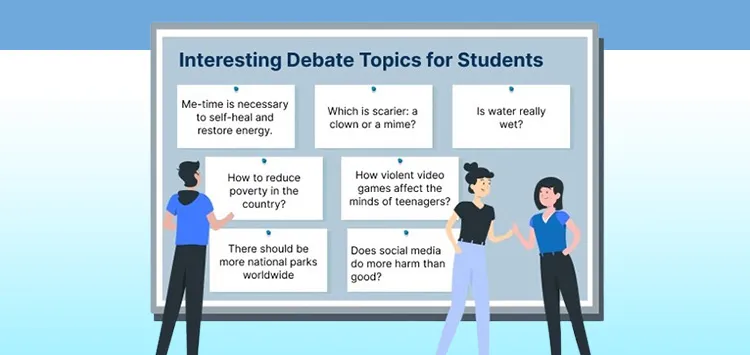Debate Topics For Students
Debate topics for students play a crucial role in honing their critical thinking skills and fostering a culture of constructive discourse. From the vast array of subjects available, controversial debate topics stand out as catalysts for stimulating discussions, encouraging students to explore diverse perspectives.
Controversial debate topics encompass issues that spark disagreement and varying opinions. These topics provoke intellectual curiosity, encouraging students to delve into the intricacies of societal, political, and ethical matters. Subjects like climate change, gun control, and privacy in the digital age are among the hot-button issues that ignite passionate exchanges.
Engaging with controversial debate topics not only sharpens students' argumentative abilities but also cultivates empathy and understanding. Exposure to diverse viewpoints enables students to appreciate the complexity of real-world issues and fosters an environment where they learn to respect differing opinions.
Educators often choose controversial debate topics to challenge students to think critically, research thoroughly, and articulate their viewpoints effectively. This process enhances their analytical skills, public speaking abilities, and overall confidence. By confronting controversial subjects, students are better equipped to navigate the complexities of the modern world, empowering them to become informed and active citizens. In conclusion, incorporating controversial debate topics into student discourse not only stimulates intellectual growth but also cultivates the skills necessary for navigating a globally interconnected society.
Which DiscussionTopics Are Popular And Interesting For Students Of All Ages And Academic Disciplines?
Selecting debate topics that captivate students of all ages and academic disciplines involves identifying themes that resonate universally. For teens, in particular, fostering engagement is crucial. Current affairs provide a rich source of discussion, encompassing issues like climate change, technology's impact, and social justice. These topics spark interest and empower teens to voice their opinions on matters shaping their world.
Literary debates, analyzing classic literature or contemporary novels, appeal to diverse academic disciplines, nurturing critical thinking. Scientific discussions on emerging technologies, ethical considerations, and space exploration resonate across STEM fields, fostering interdisciplinary engagement.
In the realm of history and geopolitics, exploring global events, historical controversies, and geopolitical challenges captivates students of various disciplines. The intersection of technology and ethics, examining artificial intelligence and its societal implications, offers thought-provoking discussions applicable to diverse academic backgrounds.
Moreover, personal development topics like mental health awareness, mindfulness, and education reform appeal to students' immediate experiences. These discussions transcend disciplinary boundaries, addressing issues relevant to students across academic spectrums.
In essence, the key to popular and interesting debate topic for teens lies in their ability to transcend academic silos, connecting with students of all ages and backgrounds on issues that matter in the broader context of their lives and the world at large.
How Can Teachers Make Sure That Debate Subjects Are Current, Thought-Provoking, And Promote Critical Thinking In Their Students?
Ensuring that debate subjects remain current, thought-provoking, and foster critical thinking in students requires a strategic approach by teachers. Firstly, incorporating fun debate topics can captivate students' interest, making the learning experience enjoyable. Teachers can infuse humor, pop culture references, or contemporary issues into the topics to resonate with the students' experiences.
To maintain relevance, staying updated on current events, social trends, and global issues is imperative. This knowledge enables teachers to craft impressive debate topics that reflect the ever-evolving world, encouraging students to think critically about real-world challenges. Introducing controversial subjects stimulates discussion, prompting students to analyze multiple perspectives and develop well-reasoned arguments.
Teachers should also encourage students to choose debate topics that resonate with their interests and concerns, fostering a sense of ownership and engagement. Collaborating with students to brainstorm and select subjects ensures that debates are not only current but also reflective of the diverse interests within the classroom.
Additionally, integrating interdisciplinary elements into debate topics enhances their depth and complexity. This approach encourages students to draw connections between various subjects, promoting holistic critical thinking. By continually reassessing and updating debate subjects, teachers create a dynamic learning environment that cultivates curiosity, analytical skills, and a lifelong love for learning.
Are There Any Particular Factors To Take Into Account When Choosing Debate Themes In Order To Guarantee A Varied And Well-Rounded Spectrum Of Opinions?
Selecting debate themes that ensure a diverse range of opinions involves careful consideration of several factors. First and foremost, relevance is key. Themes should resonate with the audience and reflect current societal or cultural issues. This ensures participants are invested and passionate about the discussions.
Additionally, balance is crucial. A mix of serious and light-hearted topics can cater to varying preferences, fostering a dynamic and engaging environment. When it comes to funny debate topics for adults, it's essential to strike a balance between humor and sensitivity. Choosing themes that are amusing yet respectful can contribute to a positive and enjoyable debating experience.
Furthermore, inclusivity plays a pivotal role. Opt for themes that encompass a broad spectrum of perspectives, accommodating participants with different backgrounds, ideologies, and experiences. This not only enhances the richness of the debates but also promotes a sense of inclusiveness and mutual respect among participants.
Lastly, consider the educational aspect. Debate themes should provide opportunities for participants to research, learn, and develop their analytical skills. A well-rounded selection of themes ensures that participants gain a holistic understanding of various subjects, contributing to their overall growth and intellectual development. By incorporating these factors, BookMyEssay aims to create a platform for diverse and stimulating debates that cater to the interests and learning objectives of all participants.







 3 Bellbridge Dr, Hoppers Crossing, Melbourne VIC 3029
3 Bellbridge Dr, Hoppers Crossing, Melbourne VIC 3029




